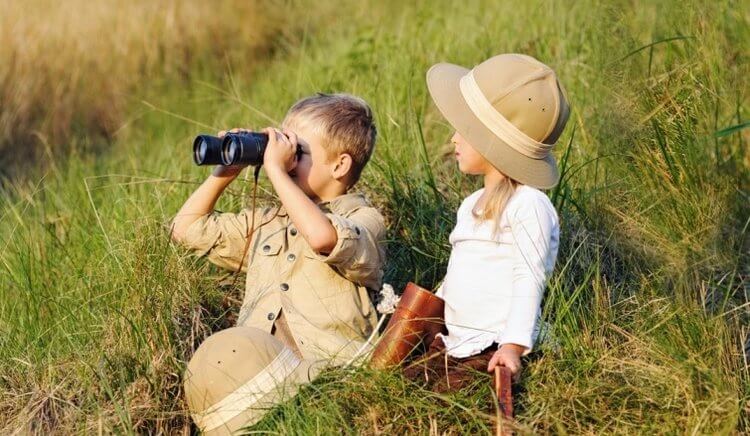Before you head out into the great outdoors for a family safari in Africa, there are a few things to consider. Here are our top 10 tips for families planning a safari adventure with smaller children…
Children’s Activity Programs
Many safari camps and lodges feature dedicated kids’ programs to keep younger ones entertained, especially when it comes to family safaris in Kruger National Park. For kids up to 8 years old, quite a few of these will involve a dedicated guide who can take the little ones out on short and safe bush walks and help them explore nature with activities like collecting feathers, pods, insects, animal droppings and identifying animal spoors. This frees up time for parents who want to go out on a game drive or participate in other adult-based safari activities.
Sleeping Arrangements
Your safari camp or lodge may ask that at least one adult shares a room with younger kids. This is for safety’s sake in case a little one wanders from the room or reacts badly to an animal approaching your room or tent. Ask your tour operator about the availability of babysitters at your camp or lodge if you’re planning on spending any length of time away from your kids, even if it’s just for a romantic dinner.
Meals & Meal Times
If you’ve got young children you probably already know how important it is to stick to regular mealtimes. Speak to your lodge or camp manager about your child’s specific dietary requirements and sort out meal times that suit everybody. Bear in mind that if your camp is planning to have earlier mealtimes an adult will have to accompany the kids to bed for safety reasons.
Safety
Your camp or lodge will probably have safety guidelines that it’s your responsibility to make clear to your little ones. Pay attention to these rules and respect the other guests at your camp.
Private Vehicle
Families planning a safari with younger children will often be required to book a private vehicle and guide. This often comes with additional costs, so speak to your safari tour operator or camp/lodge before you book your trip.
Swimming Pools
.jpg)
If your safari accommodation features a swimming pool, be aware that swimming is done at your own risk. If your children aren’t confident swimmers, check that there’s a fence around the pool and keep a close eye on them when they take a dip.
General Precautions
For family safaris in Africa, one thing that’s always present is the hot African sun. Be sure to pack sunscreen and hats and drink plenty of water – check with your safari lodge about the quality of their tap water and only drink bottled or filtered water if it’s risky. Depending on where you’re planning to travel, speak to your tour operator about the risk of malaria and follow the advice of your pharmacist when it comes to your medication. It’s always a good idea to have insect repellant, too.
Age Restrictions on Activities
Certain activities will come with age restrictions for safety’s sake. Gorilla trekking and whitewater rafting in particular require that kids are at least 15 years old. Due to the risk of dangerous animals, walking safaris also often involve an age limit. Activities like canoeing or mokoro cruises are usually left to the parents’ discretion.
Discounts for Kids
Most safari lodges and camps consider children over 12 to be adults. Obviously this isn’t to be confused with minimum age limits or age restrictions. Very few safari camps or lodges will offer discounts to children over 12 and children under 12 will need to share accommodation with an adult to be considered eligible for a discounted rate.
Minimum Age Restrictions
Many safari lodges and camps will welcome children of all ages but there are some that do have a minimum age restriction of 4 and 12 years. If you’re booking through a tour operator, these restrictions will be taken into consideration, but if you’re booking directly be sure to ask your lodge or camp about their specific age requirements.

